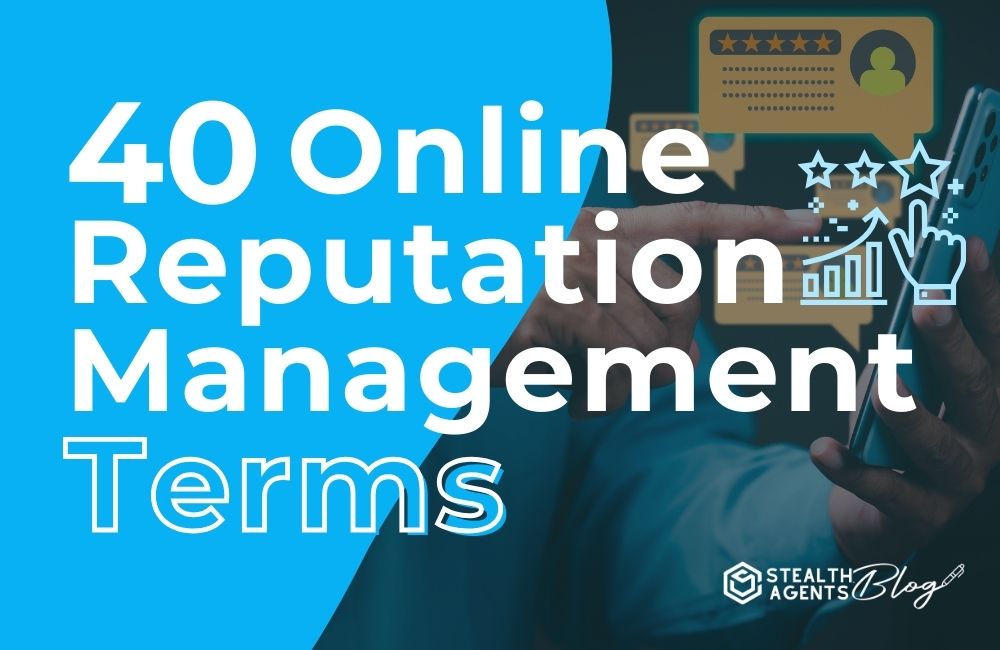Embarking on the adventure of understanding Online Reputation Management (ORM) can be akin to learning a new language. The internet world is bustling with terms and concepts crucial for shaping the public perception of any entity, be it an individual, brand, or corporation.
But have no fear; we’re here to guide you through the digital colloquialisms of ORM. Whether you’re looking to enhance your online presence or safeguard your brand’s image, this compact dictionary will prepare you to navigate the ebb and flow of the online tide. So plug in and let’s unravel the digitally flavored lexicon!
Embracing the Reputation Jargon
As you explore ORM, you’ll encounter a diverse set of terms that articulate the nuances of digital brand image curation. These terms are more than just vocabulary; they’re the building blocks of a winning strategy or the insights required to interpret and summarize the situation.
1. Online Reputation: The collective perception or image of an individual or brand on the internet based on the information available online.
2. Reputation Monitoring: The continuous observation and analysis of an entity’s mentions in online media, allowing for a proactive response to emerging issues or trends.
3. Brand Sentiment Analysis: Evaluating the tone of online mentions to gauge the prevailing sentiment towards a brand, be it positive, negative, or neutral.
4. Digital Footprint: The trail of an individual’s or brand’s online history, including social media activity, website content, and any mentions across the web.
5. Review Management: The systematic approach to handling customer feedback, predominantly focusing on reviews left on various platforms.
6. Online Crisis Communications: Strategies employed to manage the narrative during a sudden or unforeseen online reputation crisis.
7. Search Engine Results Page (SERP) Management: Tactics to influence and maintain a desirable position and image in search engine results.
8. Proactive ORM: Preemptive measures taken to strengthen and manage online reputation before an issue arises, often leveraging SEO and content marketing.
9. Online Branding: Cultivating a brand’s online persona through consistent messaging, aesthetics, and customer interactions across digital platforms.
10. Social Listening: The practice of monitoring social media channels for mentions and conversations related to a brand, industry, or topic.
11. Influencer Management: Building and nurturing relationships with influencers to promote positive messages and counteract negative publicity.
12. ORM Tool: Software or platform designed to aid in monitoring, analyzing, and managing an entity’s digital reputation.
13. Content Strategy: A plan for creating and distributing content designed to engage an audience and support the overall online reputation goals.
14. Sentiment Score: A numerical representation of the emotional tone behind online mentions of a brand, typically calculated by ORM tools.
15. Reputation Score: An aggregate evaluation, quantifying the overall standing and health of a brand’s reputation online.
16. Review Generation: The active process of creating opportunities for customers to leave feedback and reviews.
17. Defamation Removal: Strategies and actions taken to eliminate or counteract defamatory content about a brand or individual online.
18. SEO Reversal Management: SEO strategies aimed at mitigating the impact of negative content on search engine results for a brand or individual.
19. Online Privacy Management: The preservation of personal or brand data online to prevent misuse and maintain a positive reputation.
20. Review Response Time: The average time taken to acknowledge and respond to reviews, influencing customer service perception.
21. Online Reputation Audit: A comprehensive analysis of the digital landscape to identify strengths, weaknesses, and opportunities for a brand’s online reputation.
22. Employee Training: Initiatives to educate staff on the importance of their roles in the brand’s online reputation, especially in customer-facing positions.
23. Reputation Repair: Post-issue strategies and tactics aimed at redeeming a tarnished online reputation.
24. Iterative ORM Strategy: A flexible approach to ORM that adapts and evolves based on new situations, learning, and feedback.
25. ORM Outsourcing: Engaging third-party ORM specialists to manage various aspects of maintaining a brand’s online reputation.
26. Online Influence Measurement: Gauging the sway and impact a brand or individual holds in online conversations and communities.
27. Online Mistake Recovery: The process of acknowledging and rectifying errors publicly and transparently to rebuild trust in the brand.
28. Website Reputation Management: The task of keeping a brand’s website content positive, engaging, and reflective of the company’s desired reputation.
29. Review Calculation Algorithm: The proprietary software or formula used by review platforms to enhance credibility and accuracy in published reviews.
30. Online Engagement Metrics: Quantitative measures of how actively an audience interacts with a brand online, including likes, shares, and comments.
31. Brand Protection: Legal and procedural measures taken to safeguard the intellectual property and reputation of a brand from misuse, impersonation, or abuse.
32. Online Community Moderation: Overseeing and regulating online discussions and comments to maintain a healthy, respectful, and on-brand environment.
33. Customer Advocacy Programs: Encouraging and empowering satisfied customers to become advocates and defenders of a brand in digital spaces.
34. Digital PR Activities: Public relations strategies tailored to the digital realm, encompassing influencer outreach, content creation, and thought leadership in online publications.
35. Transparency and Authenticity Practices: Creating open and genuine online experiences to foster trust and connection with the audience.
36. Online Crisis Detection: Tools and methods employed to swiftly identify potential reputation threats before they escalate.
37. Link Management: Strategic control and nurturing of inbound and outbound links to enhance a brand’s authority and trustworthiness online.
38. Online Offline Consistency: Ensuring coherence between a brand’s online and offline reputation management efforts, messaging, and customer experience.
39. Review Policy Creation: Documenting guidelines and procedures for the collection and publication of customer reviews across various channels.
40. Community Building: Cultivating a supportive and engaged online community around a brand, crucial for long-term reputation management.
In Conclusion
While this glossary provides a formidable arsenal of terms, remember, in ORM, application reigns supreme. Each term is more than just a definition; it’s a component of a living, breathing strategy. So whether you’re protecting a corporate entity or nurturing a personal brand, understanding and using these terms will fortify your approach and steer you towards a resilient and respected online reputation.
Dive into the depths of this ever-evolving field, and remember that in the labyrinth of digital dialogue, a wise and proactive approach wins the day. Your online reputation isn’t just defined by the content you create but by the actions you take to curate and protect it.












